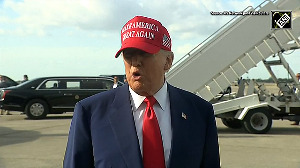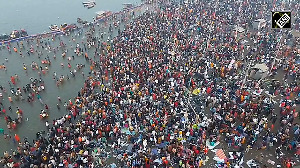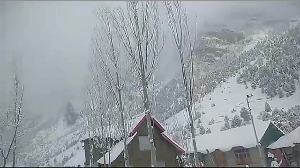The Indian elections in no way precluded the United States from working jointly with India to try to alleviate the lot of the affected Tamil civilians caught up in the crossfire between the Liberation Tigers of Tamil Eelam and the Sri Lankan troops, the outgoing point man on South Asia for the Obama Administration has said.
Assistant Secretary of State for South and Central Asian Affairs Richard Boucher told rediff.com during an interaction with a select group of journalists that "We've been working very closely with India and the Secretary (of State Hillary Clinton) had consultations with Indian counterparts," on Sri Lanka.
"We've had visiting Indian diplomats. We've been able to confer with India. (And) I myself have had phone-calls just to keep in touch as we always to," he said.
Boucher also said that "after we've done co-chair discussions (on Sri Lanka, with the major donor groups), we've always informed India and conferred with India."
"And, so, we are very much working with India on the Sri Lanka situation," he reiterated, and "it (the elections) hasn't held them back as far as I can tell."
Earlier, the US Central Command had seriously considered launching a massive evacuation of the civilians caught up in the middle of the fighting, but had given up the idea when it found it was not feasible unless there was a cessation of the fighting at least for a couple of days when such an operation could have been undertaken.
At the time, senior Administration officials had told rediff.com that the US had kept India fully apprised of its intentions so as not to catch New Delhi off guard and in a sense embarrass India since it is the regional power in South Asia.
One official at the time said that if indeed such a ceasefire had been agreed to by both parties, the evacuation would have been launched jointly with India since both the US and Indian militaries had worked in concert during the tsunami more than four years ago to bring relief to Sri Lanka when it was severely affected by the devastation wreaked by nature.
Meanwhile, Boucher in response to questions from rediff.com, that for all of the protestations by the US--including a call from Clinton to Sri Lanka President Mahinda Rajapakse expressing dismay over the mounting humanitarian crisis and the civilians killed by the ongoing shooting war between the LTTE and government troops -- Colombo had largely ignored the concerns, refused to acknowledge that the US had lost all leverage with Sri Lanka, which apparently was now receiving massive amounts of assistance from China and Iran, and also logistical support from the Pakistani military.
Senior diplomatic sources have also told rediff.com privately that the US has no moral fiber in expressing concern over collateral damage, considering the massive collateral damage in terms of loss of innocent lives the US had inflicted with its bombings in Iraq, Afghanistan, and now with its predator drone attacks in Pakistan.
Boucher acknowledged, "I know Sri Lanka gets assistance from different parts of the world, and sometimes they get business and investment from other parts of the world."
But he argued that "to have a prosperous economy, you need to be able to have business and investment with all the world and the United States still plays a very importance role on those issues."
"We play an important role on issues of democracy and international relations and I do think we are still listened to," he said.
Boucher said that "we've always seen Sri Lanka as a democracy -- has been a democracy. We've supported democracy in Sri Lanka and we've also expected Sri Lanka's leaders to live up to democratic values and standards."
He asserted that "we have no brief whatsoever for the Tamil Tigers. We've condemned their terrorism, we've condemned the way they've been holding civilians and we've made very clear they need to release the civilians and lay down their arms to a neutral third party it's time for them to stop fighting."
But Boucher added, "At the same time, we expect the government to meet the standards that one expects of a democracy -- and in fact, we expect them to meet the standard that they've set themselves."
"When they say no heavy weapons, when they say no-fire zone, when they say no aerial bombardment, when they say no combat operations, we believe them."
"And, frankly, it's a very strong disappointment to see that they haven't lived up to those standards. They've failed to meet their own commitments," he argued. "And, so, that's where a lot of our concern is."
Boucher said, "We do think it's important as they go about this -- to end the conflict, the end of the terrorism -- it's done in a manner that doesn't sow any seeds of a future conflict and in a manner that actually opens the door to future political arrangements on the island, where everybody on the island can live with peace and some degree of autonomy -- the kind of things that have been discussed in the past."
"So, we are certainly not holding them to any different standards. We are just expecting them to act like a democracy -- to meet their own commitments and to take a view that this is to be solved in a manner that opens up a political door to stable set of political arrangements on the island," he added.






 © 2025
© 2025